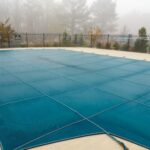Table of Contents
- 1 Why Proper Pool Closing Is Essential
- 2 When to Schedule Your Pool Closing
- 3 What’s Included in Our Pool Closing Service
- 4 Proper Closing Procedures for Above-Ground Pools
- 5 Customer Responsibilities at and After Pool Closing
- 6 Inspect Your Pool Cover Before It’s Time to Close
- 7 Why Pool Owners in Connecticut Choose The Swimming Pool Store
Why Proper Pool Closing Is Essential
Cold weather and freezing temperatures pose serious risks to pools that are not correctly closed for the season. Improper shutdown can result in cracked plumbing lines, damaged pool equipment, and persistent algae growth that will surface when reopening in the spring. Taking the proper steps to close your pool is key to protecting your investment and ensuring a smooth, hassle-free opening next year.
When to Schedule Your Pool Closing
Choosing the right time to close your pool depends on local weather conditions, the temperature of your pool water, and your swimming habits. In Connecticut, most pool owners opt to close their pools from mid to late September, once daytime temperatures consistently drop and leaves begin to fall.
If your pool is heated, you may be able to prolong closing your pool as long as possible, but keep in mind that closing too late increases the risk of freezing pipes and equipment damage.
Closing too early, on the other hand, can trap heat and organic matter under the cover, potentially leading to algae growth.

A general guideline is to wait until your pool water stays below 65°F for several days in a row. This temperature slows algae growth and stabilizes water chemistry, setting your pool up for a cleaner opening in the spring.
What’s Included in Our Pool Closing Service
At The Swimming Pool Store, we provide a complete pool closing service designed to protect your pool from harsh Connecticut winters and make spring reopening stress-free. Our technicians follow a detailed checklist so nothing is overlooked:
- Remove ladders, fittings, and rails and store them neatly on your property if requested.
- Clean and inspect filters, including spraying cartridges and backwashing sand or DE filters. (Pressure washing DE filters or replacing sand is available by request.)
- Drain and winterize pumps, filters, heaters, and separation tanks to prevent freeze damage.
- Blow out and plug all circulation lines, removing fittings to protect plumbing.
- Remove and store salt cells in your shed or near the pool.
- Leave the pump and heater drain plugs in the basket for easy access during spring opening.
- Add a precise winter chemical mix—12.5% liquid sodium hypochlorite shock, winter algaecide, and pool line antifreeze—for pools up to 30,000 gallons. (Additional chemicals may be required for larger pools.)
- Secure your pool cover—whether mesh or solid—ensuring it’s properly installed. For solid covers, we fill water bags to keep them in place.
- Make detailed notes on your invoice about any issues observed with your water quality, cover, or equipment.
Additional services, such as disassembling and storing your pump or filter system, are available upon request. Features like waterfalls or separate pumps may add a small fee, and customers are responsible for providing any new water bags or winterizing equipment if needed. By following this proven process, we make sure your pool is fully winterized, safe, and ready to handle months of freezing temperatures. Learn more about our professional pool closing services and schedule your appointment before the season fills up.
Proper Closing Procedures for Above-Ground Pools
Closing an above-ground pool correctly is essential, particularly in Connecticut, where severe winter weather can take a toll on your pool’s structure and equipment. Following the proper steps ensures your liner, plumbing, and machinery are protected, making spring reopening hassle-free.
Our Above-Ground Pool Closing Process Includes:
- Disconnecting and thoroughly draining pumps, filters, and hoses
- Blowing out and securely plugging the return and skimmer lines
- Installing winter plugs or skimmer covers as required
- Adding a carefully measured mix of winterizing chemicals to maintain water quality
- Securing the winter cover to keep out debris and wildlife

Because above-ground pools are especially vulnerable to the elements, it’s crucial to ensure every component is winterized correctly and tightly covered. Our team takes every precaution, giving you peace of mind that your pool will remain in excellent condition until the next swim season. Learn more about our procedures to close above-ground pools, and schedule your pool closing today.
Customer Responsibilities at and After Pool Closing
While our team handles every technical detail of winterizing your pool, there are a few key steps customers need to take to ensure a smooth service and reliable protection all season long. Customers are responsible for a few critical pool closing steps:
- Winterizing Materials: All plugs, gizmos, covers, and water bags should be left in an accessible location. If they’re missing or damaged, TSPS will provide replacements and add them to the invoice.
- Power Access: A reliable and visible power source must be available for the technicians. If not, the appointment will need to be rescheduled.
- Cover Maintenance: After closing, customers must monitor solid covers and prevent more than 2–3 inches of water, ice, or debris from accumulating. TSPS is not responsible for cover collapse or damage caused by neglect.
- Equipment and Accessibility: Essential equipment (such as O-rings, gaskets, plugs, pumps, filters, etc.) must be accessible on the day of service. If not, additional visits will incur an hourly service charge.
- Rodents and Winter Damage: Customers should check their pool equipment periodically throughout the winter for signs of rodent activity, weather damage, or other issues. Learn more about keeping rodents out of your pool equipment during the winter months.
- Storage Requests: If specific equipment needs to be stored indoors, customers must inform TSPS when scheduling. TSPS cannot store electric heat pumps or gas heaters that are still connected to the gas line.
- Exclusions: Pool closing service does not include repairs to pool construction, landscaping, plumbing, or equipment unless specifically requested.
- Cover Condition: If the pool cover is already damaged, TSPS will inform the customer, but is not responsible for resulting issues.
Following these steps ensures your pool remains protected throughout the harsh New England winter and avoids complications when it’s time to reopen in the spring. Learn more about the importance of following proper pool closing procedures in Connecticut.
Inspect Your Pool Cover Before It’s Time to Close
According to the CDC, drowning remains the leading cause of death for children ages 1–4. A properly installed safety cover is an essential barrier for preventing accidents, especially during the off-season when pools are unattended. A properly fitting safety cover can protect children, neighbors, and pets.
Before your pool closing appointment, take a few moments to inspect your pool cover, especially if it’s been through several winters.

Mesh and solid safety covers can show signs of wear that may go unnoticed until they fail during a storm. Look for frayed straps, weakened or corroded anchors, sagging mesh, or cracks in the vinyl surface. Any of these could mean your cover no longer provides the protection it was designed for.
A safety-rated cover should meet ASTM F1346-91 safety performance standards, which include requirements for weight support (usually 485 lbs.), tamper-proof anchoring, and minimal gaps between the cover and pool edge. If your cover no longer meets these criteria, or if you’re unsure about its condition, our team can inspect it and recommend repair or replacement. Planning now allows enough time for a custom replacement to be fabricated and installed before your scheduled pool closing.
For help evaluating your existing cover or exploring new cover options, visit our Pool Safety Covers page. We offer professional inspections and expert installation to make sure your pool is secured for the winter.
Watch our expert crew in action installing a cover:
[button size=”md” type=”primary” href=”https://www.theswimmingpoolstore.com/pool-safety-covers/winter-swimming-pool-covers/” target=”_blank”]Pool Safety Cover Installation Video[/button]
Why Pool Owners in Connecticut Choose The Swimming Pool Store
Closing your pool correctly is one of the most important steps in protecting it through the long Connecticut winter. It goes far beyond pulling on a cover—every detail matters. At The Swimming Pool Store, our technicians bring decades of experience to the job, making sure nothing is overlooked. We handle everything from lowering water levels and winterizing your plumbing lines to draining and protecting pumps, filters, and heaters.
We also add the right blend of winter chemicals—shock, algaecide, and antifreeze—to help your pool water stay clean and balanced until spring. Before we leave, we secure your safety or winter cover and check fittings, gaskets, and equipment so you’re set for the season ahead. If extra supplies are needed, we’ll let you know right away.
With over 55 years of pool care experience, TSPS has built a process that prevents freeze damage, reduces algae risk, and makes reopening your pool in spring easier than ever. Learn more: How to Close Pool for Winter: Complete Guide, Tips, and Step-by-Step Instructions.
See everything included in our professional pool closing services and why so many Connecticut homeowners trust our team year after year.
We’ve been helping Connecticut pool owners for decades, offering trusted service, expert guidance, and access to the highest quality pool closing products and safety covers. When you book with us, you’ll get a clear timeline, friendly communication, and confidence that your pool is in good hands. Schedule your pool closing with us today and protect your pool investment through the winter months.



